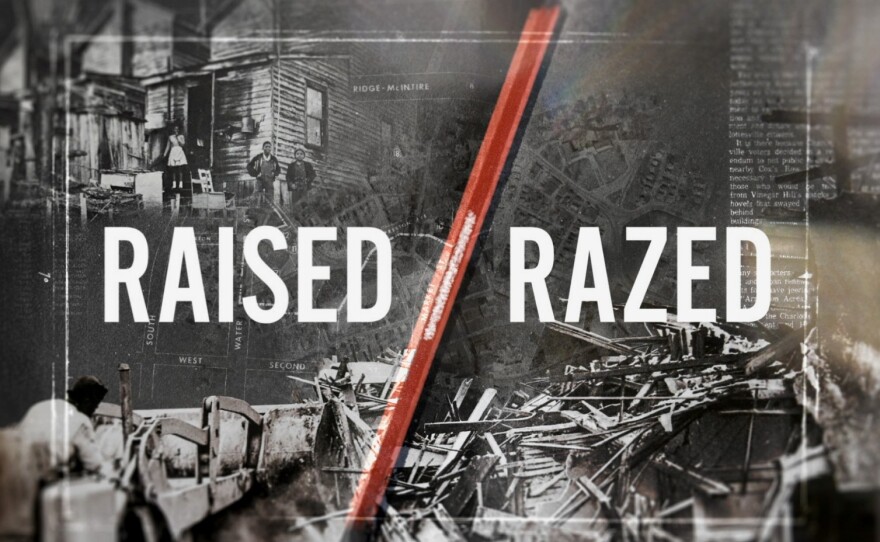When filmmaker Lorenzo Dickerson was young, he listened to his elders speak in bits and pieces about a once-thriving community in Charlottesville, VA called Vinegar Hill. As he grew older, he learned the Black neighborhood was destroyed in the 1960s and the residents relocated under the banner of “Urban Renewal.” Local government razed the community in order to dispose of what white Charlottesville officials widely described as a “slum.”
And yet, the stories of Vinegar Hill that Lorenzo heard as a youth didn’t fit the picture painted by white leaders and the local media. Vinegar Hill sounded like warm and well-kept homes filled with tight-knit neighbors. It sounded like a community.
Dickerson’s partner, journalist Jordy Yager, also grew up in Charlottesville. Like Lorenzo and many adults today, Yager’s formal education was not fully inclusive of the contributions African Americans made to this country’s economic, cultural, spiritual, and political landscape. Nor did it cover systemic racism, sanctioned by the U.S. government, and carried out in programs like Urban Renewal.
Together, they tell the story.
In their new documentary, Raised/Razed — produced by Dickerson’s company Maupintown Media in association with VPM – the duo highlights a century of Black life in Vinegar Hill and the neighborhood’s ultimate destruction. However, Dickerson and Yager seek to change the Vinegar Hill narrative. They shine a light on the shameful history of Urban Renewal, primarily in Charlottesville, but also in Durham, NC, and other communities throughout the nation; and they urge local reparations for all that was lost so many years ago.
Dickerson hopes Raised/Razed presents Vinegar Hill’s story, one filled with life and community, rather than destruction. The film shows the viewer what it was like to live there by hearing from the people who did.
“I hope viewers will more fully understand that what was once there was more than just physical buildings, but rather a community of collective experience and togetherness that was disrupted for the sake of commerce, and could not be recreated in the same way,” says Dickerson.
But the documentary is more than just the story of one neighborhood. It is also the story of the greater Charlottesville community during the time of Jim Crow, Civil Rights, and Massive Resistance.
“The story of Vinegar Hill is the story of Charlottesville,” says Yager. “The children raised in Vinegar Hill grew up to become teachers, pastors, doctors, barbers, politicians, civil rights leaders, and so much more. These are the people who built our city, who fed it, and who forced it to grow to become a better version of itself.
“If we don't know our history, what does it say about our future?”
Vinegar Hill was not the only community lost to Urban Renewal.
The Urban Renewal Program was underwritten by the Department of Housing and Urban Development (HUD) and was carried out by localities throughout the United States from 1949 to 1974. During those 25 years, more than 600 cities, towns, and counties implemented the program -- including Durham, NC where Raised/Razed begins -- displacing more than a million people, 600,000 of whom were Black.
Support for Urban Renewal came from mostly white leaders making decisions about neighborhoods of color. Redlined Black neighborhoods had little voice in what happened to their communities because this program came at a time when African Americans had limited power to enact local change through voting or as elected officials.
Hundreds of neighborhoods across the country experienced the same fate as Vinegar Hill. The communal and economic loss reverberates today in the lives of those who lived in these communities as well as their descendants.
Beyond teaching a fuller history of Urban Renewal in Charlottesville and in schools across Virginia, Dickerson and Yager hope this film will spur Charlottesville to create programs to redress and repair what was lost. Other U.S. cities have faced their past under Urban Renewal and are doing this very thing.
“With the research we’ve collected for Raised/Razed, we now have all the material we need to get started with this reckoning in Charlottesville,” says Yager. “We know exactly what was taken, who it was taken from, who took it, and the immediate and compounded impacts it has had.”
See a free preview and panel discussion of Raised/Raised on April 30 at 7 p.m. at The Jefferson School, 233 4th Street NW, Charlottesville, VA 22903. Donations are encouraged and can be made online when registering for the screening or in-person at the event. The funds will be distributed to seven African American-led organizations serving Charlottesville’s Black communities. Register online to attend.
Raised/Razed will premiere on VPM PBS on Thursday, May 12 at 9 p.m. Streaming is also available on the VPM website or through PBS Passport.
Correction: A previous version of this story incorrectly reported that Jordy Yager was unaware of Vinegar Hill as a child. We have corrected the article and made additional edits. We apologize for the error.



